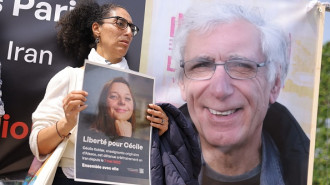Syrian regime airstrikes target besieged Eastern Ghouta, Deir az-Zour
More than 19 civilians were killed in Eastern Ghouta on Sunday as the Syrian regime stepped up its campaign to retake the last major opposition stronghold near the capital Damascus.
At least 123 civilians have been killed in the besieged suburb by airstrikes and shelling since the Syrian regime and Russian jets began an offensive nearly two weeks ago, the Syrian Observatory for Human Rights said.
A witness told Reuters that there had been drones in the sky since Sunday morning, with warplanes heavily bombing the towns of Mesraba, Harasta and Eastern Ghouta, killing at least 19 civilians.
The opposition Eastern Ghouta Damascus Countryside local council said this week that the intensifying bombardments were forcing people to seek shelter in unsuitable and unsanitary places which it feared could lead to disease outbreaks.
Eastern Ghouta has been under siege by Syrian regime forces since 2013, and no food aid convoys have entered the town of Douma since wheat flour rations in August.
Civilians are eating rubbish, fainting from hunger and forcing their children to eat on alternate days because of the food shortage, the UN World Food Programme said this week.
Nearly 174,500 people trapped in the town of Douma since September have been forced to adopt emergency "coping strategies", the UN said.
WFP expects the situation to further deteriorate in the coming weeks when the current food stock is expected to be depleted completely, eroding the current household coping strategies.
In the east of Syria, Russian air strikes on Sunday killed 34 civilians, among them 15 children, in a village held by Islamic State in Deir az-Zour province, an activist group said.
The Britain-based Syrian Observatory for Human Rights said the strikes hit the village of Al-Shafah, on the eastern bank of the Euphrates River, in the early hours of Sunday morning.
The Syrian conflict began when the Baath regime, in power since 1963 and led by Assad, responded with military force to peaceful protests demanding democratic reforms during the Arab Spring wave of uprisings, triggering an armed rebellion fuelled by mass defections from the Syrian army.
The brutal tactics pursued mainly by the regime, which have included the use of chemical weapons, sieges, mass executions and torture against civilians have led to war crimes investigations.





 Follow the Middle East's top stories in English at The New Arab on Google News
Follow the Middle East's top stories in English at The New Arab on Google News

![The law could be enforced against teachers without prior notice [Getty]](/sites/default/files/styles/image_330x185/public/2178740715.jpeg?h=a5f2f23a&itok=xMdFOAIF)
